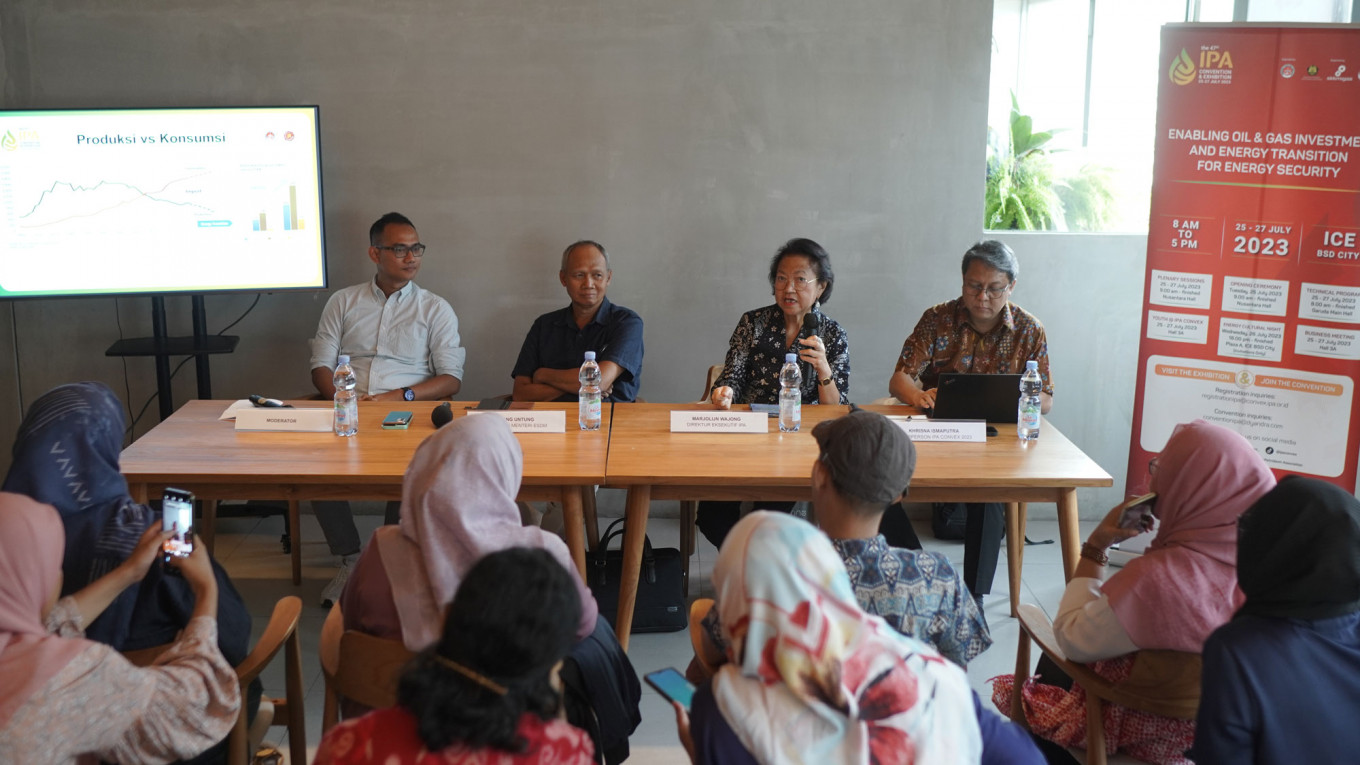Popular Reads
Top Results
Can't find what you're looking for?
View all search resultsPopular Reads
Top Results
Can't find what you're looking for?
View all search resultsThe dilemma of the need for oil and gas amid net-zero goals
The government’s goal of reaching its net-zero emission (NZE) target is a challenging one, given how much the country relies on the abundant resources of natural gas and oil.
Change text size
Gift Premium Articles
to Anyone
T
he government’s goal of reaching its net-zero emission (NZE) target is a challenging one, given how much the country relies on the abundant resources of natural gas and oil. It is projected that once NZE is achieved, the absolute need for fossil energy in the form of oil and gas will continue to increase, but with a decreasing proportion of the total energy mix.
In the National Energy General Plan (RUEN) by 2050 the demand for oil is projected to increase by 139 percent, and the demand for gas will increase by 298 percent. In that year, national energy demand is estimated to reach around 1,000 million tonnes of oil equivalent (Mtoe) with 44 percent coming from oil and gas, so demand for around 440 Mtoe will need to be met.
One of the obstacles to the energy transformation is the fact that various sectors cannot completely adopt new and renewable energy (EBT), hence they will continuously need oil and gas to continue. An example is the transportation sector.
However, to not jeopardize the NZE target set forth by the government, the projection is based on condition that carbon emissions produced by oil and gas activities must be captured and stored through technology or planting trees as carbon sinks. The goal is to achieve energy security from Indonesia's energy mix, which consists of coal, oil, gas and EBT, and at the same time achieve the NZE commitment.
Nanang Untung, Expert Staff of the Ministry of Energy and Mineral Resources for Oil and Gas Integration, Coordination and Interface Division, revealed that a fundamental need for the utilization of domestic oil and gas potential is the presence of investors who have financial and technological resources to see the energy’s potential.
"We still really need investors. We are maximizing the energy transition, it is impossible for us to live without fossils until one day energy is fully supplied, batteries are still expensive and we are still dependent on the climate until there is technology, maybe we still need fossils. The predictions are that all parties will still have a role for fossil fuel until 2050," Nanang said in a discussion with the Indonesia Petroleum Association (IPA) meets Blogger event in Jakarta on July 11.
"We will not be disconnected from petrochemicals, because its main raw materials are oil and gas," adds Nanang, admitting that various sectors will continuously need the upstream oil and gas sector.
Moreover, the oil and gas upstream also provides a significant amount of state revenue. Based on data from the Special Task Force for Upstream Oil and Gas Business Activities (SKK Migas), oil and gas sales directly contributed around Rp 672 trillion, consisting of proceeds from the sale of oil and gas of around Rp 583 trillion. An allocation of oil and gas profit-sharing funds add up to a total of Rp 17 trillion, which was also felt by the producing regions. Other revenues from upstream oil and gas are calculated to amount to around Rp 89 trillion, which include signature bonuses, production bonuses, firm commitments, payment of VAT, oil and gas PBB, PDRD and oil and gas income tax and other income.
Meanwhile, Marjolijn Wajong, IPA executive director, explained that Indonesia's position as a large oil and gas producer continues to shift along with the decline in oil production from year to year. Three decades ago, production could reach more than 1 million barrels per day (bpd), sometimes reaching 1.6 million barrels, but at the turn of the new millennium, production declined to its current position of around 600,000 bpd.
However, the need continues to increase. The average need is currently at 1.5 million bpd, which puts a significant burden on state finances because Indonesia has to start importing oil and fuel. To be able to increase oil production to meet these needs, synergy between the government and business actors is very important.
"The need for energy will continue to increase in the future. The potential [for oil and gas] is there, but it must be explored first. In the oil and gas industry, the costs are enormous. If the government spends the money, it is not certain that they will find reserves, the money can be lost. So, the government has a way, namely to bring in investors. We have to attract investors who have money," explained Marjolijn.
She does believe that Indonesia's effort to move toward clean energy is the right policy because it participates in supporting the global trend that is increasingly concerned about the environment.
The country’s efforts to achieve clean energy take time. The transformation to electric vehicles, especially electric cars, may take more than a decade. The potential for solar energy, which is indeed large, is still unable to sustain one whole day without the help of battery technology.
"Meanwhile, we are still waiting for clean energy to be more ready, what do we use? Only two are produced on our own [oil and gas], or buy it from overseas. Of course, we have to work on our own, we business players cannot be lax, we are trying to export [oil and gas production] that we have," said Marjolijn.










